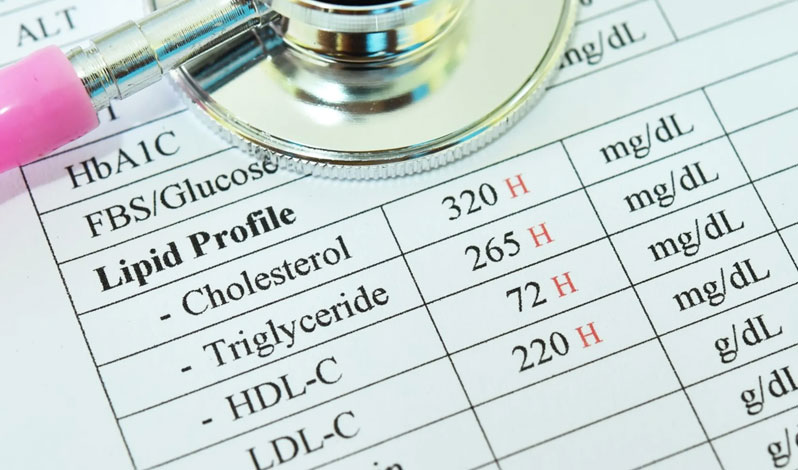
08, Sep 2020
September is National Cholesterol Education Month. To honor this month, I would like to recommend the community get their blood cholesterol levels checked and take action if it is high.
Cholesterol is a fatty chemical made in the liver and found in foods such as dairy products, meat and eggs. The lipoprotein panel includes: LDL (low-density lipoprotein cholesterol, also called "bad" cholesterol) which is the major carrier of cholesterol in the blood.
LDL particles deposit on the artery walls, causing the formation of a hard substance called cholesterol plaque, which over time, causes thickening of the artery walls and narrowing of the arteries, a process called atherosclerosis.
Triglycerides are fats carried in the bloodstream from the food we intake.
Excess alcohol, calories or sugar in the body are converted into triglycerides and stored in fat cells throughout the body.
Your lipid profile is a measure of total cholesterol, LDL, HDL (high-density lipoprotein cholesterol, also called "good" cholesterol) and triglycerides.
High cholesterol usually doesn't have any symptoms. You will not know about your high cholesterol unless you go for a screening blood test called a lipoprotein profile.
Adults age 20 years or older must have their lipid profile checked every five years. Women age 45 and older and men aged 35 and older are routinely screened for lipid disorders.
Atherosclerotic cardiovascular disease is one of the leading causes of death in the United States, accounting for about 600,000 deaths annually.
According to the American Heart Association Task Force and American College of Cardiology, managing high cholesterol is important in reducing negative outcomes in this multifactorial disease state.
Besides smoking and blood pressure, blood cholesterol is a major controllable risk factor for coronary artery disease.
Several factors contribute to elevated cholesterol. Some of the non-controllable factors include gender (women are at higher risk after menopause), age (women above age 55 and men above age 45), and a family history of high cholesterol.
Controllable factors include being overweight, eating a high-fat diet, not getting enough exercise, smoking and drinking alcohol.
Saturated fat and cholesterol, which come only from animal products, raise your LDL level and, therefore, a high rate of acute coronary events in the United States.
Some examples of cholesterol-lowering foods include oats, barley and other whole grains, beans, nuts, apples, strawberries, grapes, citrus fruits, soy and fatty fish.
More: Mitra: Too much iron in your body can be harmful to your health
More: Mitra: Educating family important for Alzheimer's patients
More: Mitra: Getting shorter as you age? It may be osteoporosis
Foods that are to be avoided include egg yolks, dairy products, shellfish, including butter and some cheeses, including cream cheese, processed meats, fast foods like hamburgers, french fries and fried chicken.
When people are under stress, they satisfy themselves by eating fatty foods containing saturated fat, thereby raising cholesterol levels.
If you have an abnormal lipid profile, your doctor will recommend lifestyle changes, including low fat, high fiber diet, regular aerobic exercise, quitting smoking and alcohol.
You may also be prescribed medications.
The most common cholesterol-lowering drugs are statins. Blood tests are typically repeated to monitor therapy after 6 to 8 weeks of statin therapy.
Rarely, widespread muscle breakdown may occur with statin therapy. Some examples include atorvastatin, fluvastatin, lovastatin, pravastatin, simvastatin and rosuvastatin.
Bile acid sequestrants (Cholestyramine, colestipol, and colesevelam) lower LDL by a significant amount. These drugs are available as powder or tablets and are not absorbed from the gastrointestinal tract.
Cholesterol absorption inhibitors (Ezetimibe) reduces LDL and useful in patients who cannot tolerate taking statins.
Nicotinic acid (niacin) lowers total cholesterol, LDL, and triglyceride levels while raising HDL levels.
A common adverse effect of niacin is flushing, which can be decreased by taking aspirin 30 minutes prior to taking the medication.
Fibrates (gemfibrozil, fenofibrate) are more effective at lowering triglycerides and LDL. Side effects of fibrates may include gastrointestinal discomfort and gallstones.
PCSK9 protein inhibitors such as alirocumab and evolocumab are indicated for patients whose LDL levels are not adequately controlled with diet and statins or when statins are contraindicated.
If you believe that you are at risk for lipid disorders, please feel free to schedule an appointment with your doctor.
Dr. Sue Mitra is accepting new patients and can be reached at 321-622-6222 or info@suemitra.com. Call now to assess your cholesterol levels and cardiovascular risks.
Dr. Sue Mitra and her staff strive to offer their patients the best care, advice and services available in the medical field with the goal to keep patient healthy & happy.

Dr. Sue Mitra is board certified in international medicine. She is seen here with a Cologuard, which is a noninvasive colon cancer screening test. (Photo by: Tim Shortt/Florida Today)